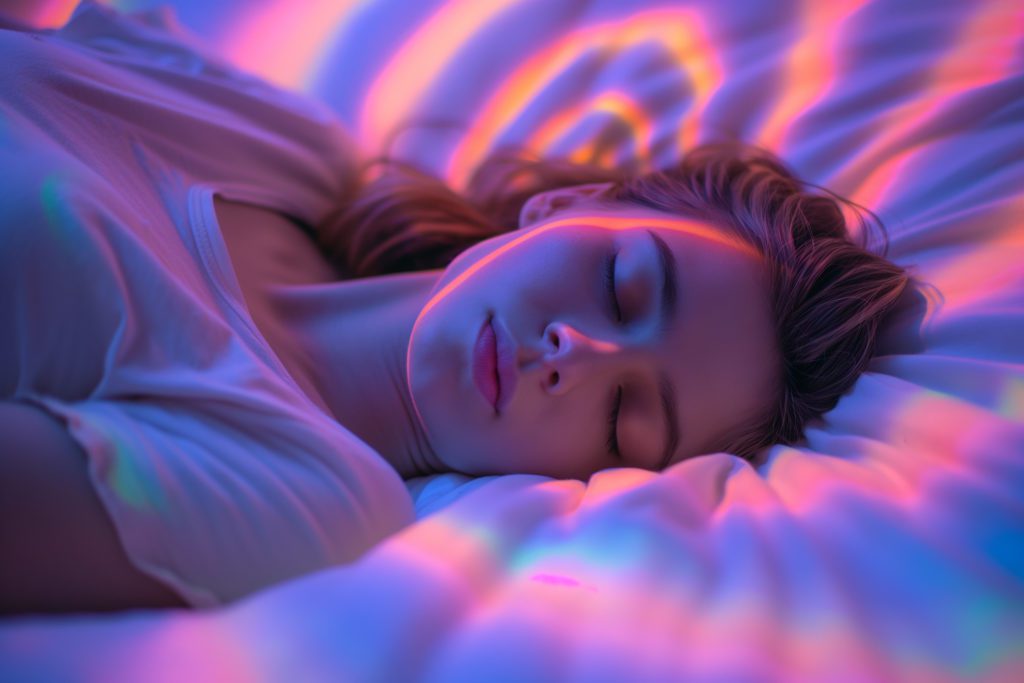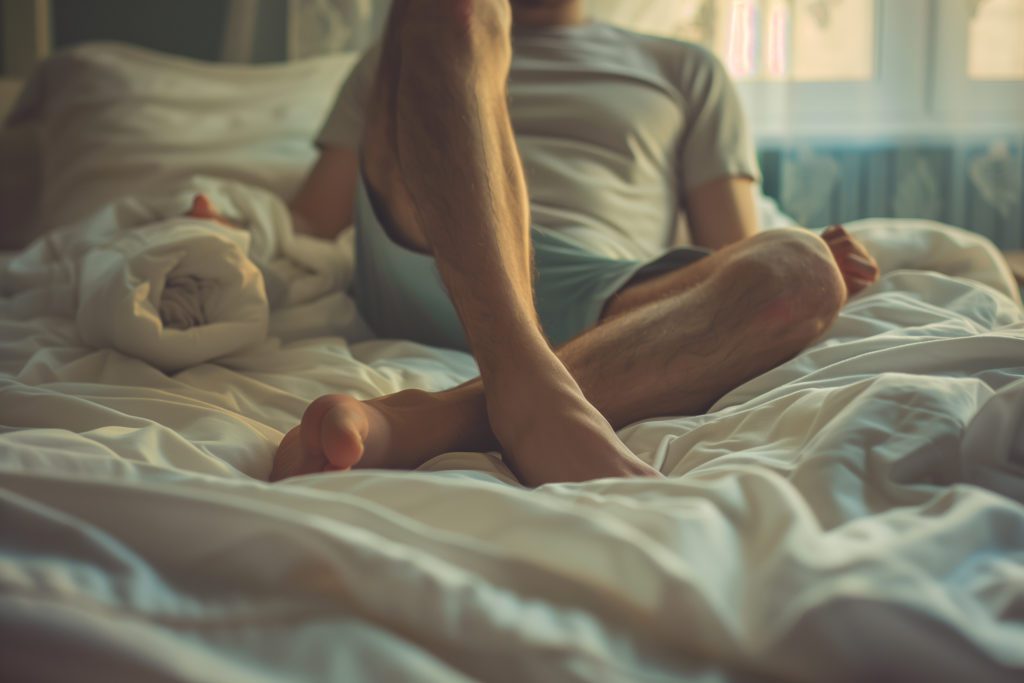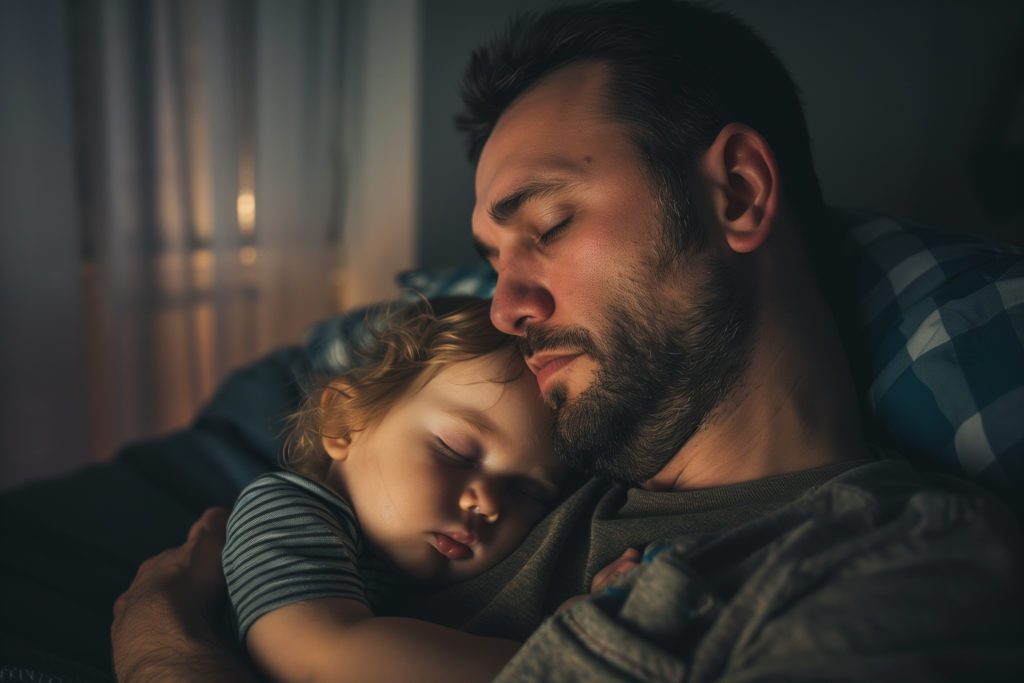
Can Medication Induce Parasomnias?
Certain medications are linked to a greater risk of parasomnias. Explore how medication can induce parasomnias and what you can do to prevent them.

Have you been told that you talk in your sleep, cry out in terror, or maybe even take a lap around the house? These are all qualities of parasomnias, and if you’ve only recently started experiencing them, they may be tied to your medication.
Certain medications can cause parasomnias by placing you in a deeper sleep state or making your muscles more tense while you’re sleeping. However, by swapping your medication (with your doctor’s help) and focusing on getting enough sleep each night, you can help prevent parasomnias from occurring.
What is a Parasomnia?
Parasomnias are sleep disorders where someone performs unusual actions while asleep, such as making abnormal movements, talking, walking, or expressing emotions.
Parasomnias are grouped based on the stage of sleep during which they happen: non-rapid eye movement (NREM) sleep or rapid eye movement (REM) sleep.
NREM sleep disorders are also considered arousal disorders because they involve physical and verbal activity—while you are not completely awake or aware during these events, you appear as though you are. Still, those around you can identify an NREM parasomnia because you are not responsive to their attempt to interact with you and typically don’t remember the event come morning.
If you have a family history of similar parasomnias, you may be more likely to experience them yourself.
The NREM parasomnias include:
- Night terrors: You wake up in a terrified state despite not remembering why.
- Confusional arousals: You appear to be partially awake, but you are disoriented and confused. You remain in bed but may sit up and open your eyes. You may speak slowly and have difficulty understanding questions.
- Sleepwalking: You get out of bed and move around with your eyes wide open despite being asleep. You may try to do complex activities, such as playing an instrument or driving, or do strange things, like remove your clothing or peeing in a place that isn’t the bathroom.
As for REM sleep disorders, they typically occur during the later part of the night since that is when you spend more time in REM sleep.
Some REM parasomnias include:
- Nightmare disorder: You have vivid dreams causing feelings of terror, fear, or anxiety. Those awakened in the middle of a nightmare can often recall it in detail and may struggle to fall back asleep.
- Recurrent isolated sleep paralysis: Those with this sleep disorder cannot move their body during sleep, which can be distressing, often causing fear or anxiety.
- REM sleep behavior disorder: You act out, make aggressive movements (e.g., kicking, punching, grabbing), or vocalize (e.g., talk, laugh, shout) in response to a violent dream.
There are also sleep disorders nonspecific to the two sleep stages:
- Bedwetting
- Exploding head syndrome
- Sleep-related hallucinations
- Sexsomnia
- Sleep-related groaning
Can Medication Cause Parasomnias?
When it comes to the causes of parasomnias, certain medications are near the top of the list because of the way that they disrupt sleep or affect your body.
For instance, some medications increase muscle tone during REM sleep, a time when the body typically enters a state of paralysis to prevent you from acting out your dreams. With medications such as selective serotonin reuptake inhibitors (SSRIs) and tricyclic antidepressants, muscle tone increases, which can make you more likely to act out your dreams, disturbing the sleep of you and anyone you share the bed with.
Other medications that can trigger REM sleep behavior disorder include venlafaxine and MAO inhibitors.
It’s not just REM sleep behavior disorder that can be triggered by medication, either. Beta-adrenergic blocking agents have been linked to sleep-related hallucinations, and Zolpidem and Zopiclone are associated with parasomnias such as sleepwalking and its more dangerous relative, sleep driving.
Finally, prescription medications that are used to treat insomnia, a sleep disorder on its own, may trigger NREM parasomnias such as sleepwalking or sleep driving. Medications that can cause these effects are also called hypnotics or sedatives and include Lunesta and Ambien.
As for how these medications do this, it’s believed that the insomnia medication increases your arousal threshold, making it harder for you to wake up based on what is occurring around you. This may also impair your memory and consciousness, which can lead to sleepwalking episodes that you don’t remember come morning.
Other Causes of Parasomnias
While prescription medications can cause parasomnias as a side effect, they are not the only cause of parasomnias. For example, drinking alcohol is believed to provoke fragmented sleep, which can cause mixed states of consciousness and an increased risk of sleepwalking.
Additionally, evidence shows that excessive use of caffeine and chocolate may cause REM behavior disorder.
Along these same lines, anything that causes a lack of sleep, whether that’s staying up late, having an irregular sleep-wake schedule from shift work, or traversing time zones, may also make you more susceptible to parasomnias. Certain medical issues can also disrupt sleep, such as obstructive sleep apnea, restless leg syndrome, pain, circadian rhythm disorder, narcolepsy, or period limb movement disorder.
Health issues can also be the culprit of parasomnias, such as:
- Stress
- Fever
- Head injury
- Pregnancy
- Menstruation
- Inflammatory disease
- Psychiatric illnesses (e.g., anxiety, depression, post-traumatic stress disorder)
- Neurological disease (e.g., stroke, Parkinson’s disease, multiple sclerosis, Lewy body dementia, migraines)
In all these cases, a lack of sleep or poorer sleep quality can lead to an increased risk of parasomnias, making sleep preservation crucial to prevent further sleep disruptions through parasomnias.
Preventing Parasomnias
If you suspect that your parasomnias are tied to a specific medication that you are taking, talk to your doctor about being prescribed an alternative treatment that is less likely to cause parasomnias.
Besides swapping medications, other ways that you can prevent any type of parasomnia include:
- Having a consistent sleep schedule
- Getting enough sleep each night
- Keeping your bedroom dark, cool, and quiet
- Avoiding caffeine and high-intensity physical activity before bed
- Limiting or avoiding alcohol
When it comes to preventing parasomnias, good sleep hygiene is your most important tool, along with being better informed about your medications. When you get enough good quality sleep, you’ll find that your nights are much less active and vocal.
FAQ
Why do beta-blockers sometimes cause nightmares or vivid dreams?
Beta-blockers, often prescribed for heart conditions and high blood pressure, can interfere with melatonin production and alter REM sleep patterns. This disruption can lead to vivid dreams, nightmares, or even sleep disturbances like sleep paralysis and increased nighttime awakenings.
Can stopping certain medications trigger parasomnias or withdrawal-related sleep disturbances?
Yes, discontinuing medications that affect neurotransmitters—such as antidepressants, benzodiazepines, or antipsychotics—can lead to withdrawal-induced sleep disturbances, including nightmares, sleepwalking, or REM rebound, where dream intensity and frequency increase temporarily.
Can taking multiple medications at once increase the likelihood of experiencing parasomnias?
Yes, combining multiple medications—especially those affecting the central nervous system, can amplify sleep disturbances and parasomnias. Drug interactions can lead to heightened neurological effects, increasing the risk of abnormal nighttime behaviors.
Are certain individuals more vulnerable to medication-induced parasomnias?
People with a history of sleep disorders, neurological conditions, high stress, or genetic predispositions may be more susceptible. Additionally, older adults, whose metabolism processes drugs differently, may be at greater risk for experiencing sleep disturbances linked to medications.
Can herbal supplements or natural sleep aids cause parasomnias?
While generally considered safe, some natural sleep aids, such as valerian root, melatonin, and kava, can cause unusual sleep behaviors. High doses or interactions with other medications may lead to vivid dreams, sleep talking, or even sleepwalking in sensitive individuals.

Written by
Jessica G
Medical writer freelancer who has written hundreds of articles on varying topics. Masters of Engineering degree in Biomedical Engineering.
Download Pillow
Get help
Press & News
Legal
Connect
X (Twitter)
Company
Copyright © Neybox Digital Ltd.



